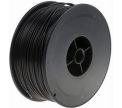3D Printer TPU Filaments : Manufacturer
TPU is known as Thermoplastic Polyurethane and is widely used engineering plastic in I industries. This is due to its superior flexibility and abrasion resistant properties over various plastic materials. It provides a good operational performance.
TPU Filament 3D Printing Guide - MANLON :
TPU is one of the most common 3D printing material that is used in FDM as filament. FDM is a Fused Deposition Model. FDM uses a layer-based approach and is a solid free-forming technology for various applications. Thermoplastic Polyurethane filament is one of the engineering materials used in 3D printing filament technology. TPU filament has many advantages such as high elasticity, transparency, flexibility and smooth finish surface. It is resistance to abrasion, grease and oil. There are TPU filaments available in the market having different hardness. MANLON offers the quality 3D printing TPU Filaments in three different hardness- Shore A-98, Shore A-92 and Shore A-85. The 3d printer filaments have different unique properties and require different operating temperatures to print.
Performance of Thermoplastic Polyurethane (TPU) Filaments:
![]() Abrasion resistant and kink resistant
Abrasion resistant and kink resistant
![]() Low friction and high flexibilty
Low friction and high flexibilty
![]() Tough and Durable
Tough and Durable
![]() Excellent tensile modulus and strength
Excellent tensile modulus and strength
![]() Light weight and Odourless
Light weight and Odourless
![]() Resistant to alkalis and organic chemicals
Resistant to alkalis and organic chemicals
Types of 3D Printer TPU Filaments:
![]() TPU Filaments - Hardness: 98A Shore
TPU Filaments - Hardness: 98A Shore
![]() TPU Filaments - Hardness: 92A Shore
TPU Filaments - Hardness: 92A Shore
![]() TPU Filaments - Hardness: 85A Shore
TPU Filaments - Hardness: 85A Shore
Available Filament colours: Available Filament sizes:
A 3d printer filament is the thermoplastic feedstock and is fused deposited to make an item using 3D printers. It is among the most common but important 3D printing materials as you cannot produce any object without 3D priner filaments. Different types of filamens are available with different properties. Each type of filament requires different set of temperatures to print. The filament is normally available in two standard sizes (diameters) of 1.75 mm and 2.85 mm to suit the extruder hole.




